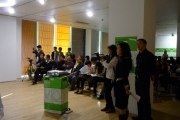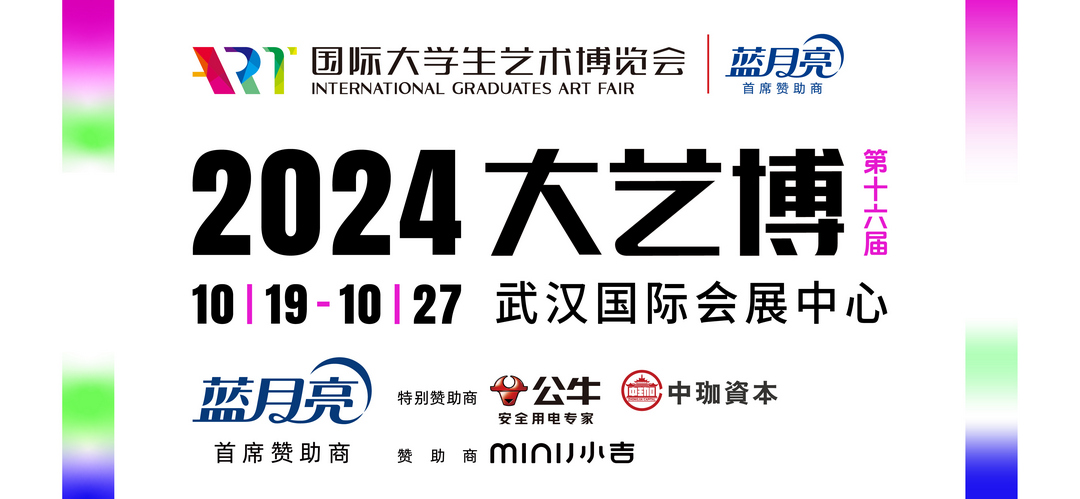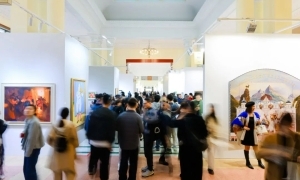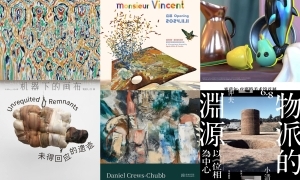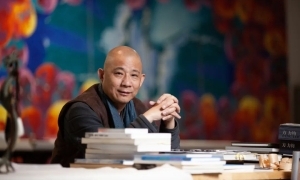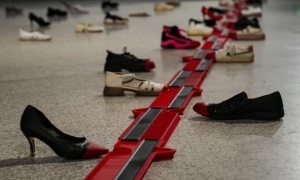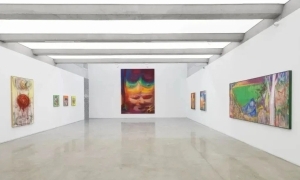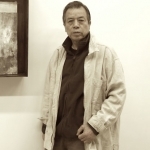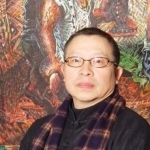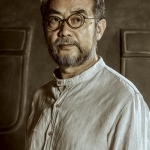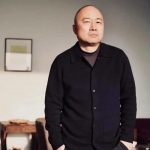Fourth Lianzhou International Photo Festival
我的照相机
My Camera and I
本届主题:我的照相机
艺术总监:段煜婷
总策展人:栗宪庭 鲍昆
策 展 人:姜纬 刘树勇
Kajsa Lindskog(瑞典) Anna Brag(瑞典) Emil Fedida(挪威)
Caprice Horn(德国) Alka Pande(印度) Gunther Dietrich(德国)
Kathryn Alice Barron(英国) Robert Pledge (美国)
Theme of the year: My Camera and I
Art Director: Duan Yuting
Chief Curators: Li Xianting Baokun
Curators: Jiang Wei Liu Shuyong
Kajsa Lindskog (
Caprice Horn (
Kathryn Alice Barron (
一、 组织机构
批准单位:中华人民共和国文化部
主办单位:连州市人民政府
承办单位:明天艺术中心
协办单位:清远日报
艺术空间设计:德默营造
制作技术支持:爱普生(中国)有限公司
Organizations
Approved by the Ministry of Culture of the People's Republic of
Official Sponsor People’s Government of Lianzhou Municipality
Organizer TOMO ART CENTRE
Cultural Partners
Media Partners
Southern Television
Qing Yuan Daily
New Express Daily
Art World
Artron.net
Artintern
City Pictorial
Chinese Photography
Media Support Contemporary Art ,
Document Support ionly.com.cn
Web Portals Sina.com, Netease.com
Exhibition Space Design DAtrans, Shanghai
Technical Support Epson
二、 前言
标准或信念
段煜婷
作为连州国际摄影年展的艺术总监,面对公众时,有一个问题或多或少总是会被问到:你的标准是什么?
我对付这个问题的办法是告诉对方,他的问题是出于对艺术总监的误解,艺术总监不是法官,手里没有法典,更不是一个质检人员,所以没有可以清晰列明的“标准”。
这样的回答通常能够让我在现场脱离困境,但是,我知道,我实际上绕过了问题的实质。记者和观众当然不是迫使我列出一二三四条精确的、通行的标准,他们要问的、他们认为他们必须知道的是,作为一个艺术总监,你对摄影的根本看法是什么,你的信念何在?
正是这个问题困住了我。摄影对我来说究竟意味着什么?它是我们的家常日用和柴米油盐,是我们的话语权力的来源,是宏大精密的知识谱系,是必须不断生产的思想、理论和概念,是我们的分工我们的学问,但是现在,一个观众穿过这一切来到我面前,他问:是什么使你选择了这一切,告诉我一个根本理由,这个理由证明这一切都有意义。
现在,我愿意试着回答这个问题。
在我们生活的大部分时间里,经历了图像观念急剧、频繁的变化,对于摄影是什么以及摄影在人类生活中的价值,我们曾经信服和发明了许多种说法,而在当下,我们有些人甚至对此产生了怀疑。但是,现在面对这个问题,我宁愿回到生命的早期,在那个急剧变化初现端倪的时代,通过各种途径,我们发现了摄影。
尽管在那时,人的自我认识、人对世界的想象还是受到严厉规约的影响,尽管有强大的真理的声音告诉你,人必须是这样、生活必须是这样,你无可选择无可争辩,但是,摄影的微光使我们看到,人可能是另外的样子,我们自身远比我们意识到的更为丰富和复杂,我们看到了经验的真实质地,看到了事物的模棱两可,看到人如何击破覆盖他的幻觉、成规、归类和论述,去发现和践行他自己的真理。
在这个意义上,摄影就是要承受傲慢与偏见,承受对它的价值的怀疑。承受着这种压力,摄影守护着语言的活力,守护着人的生动形象,守护着人的诚恳和自由。
从这样的信念出发,我认为,连州摄影年展这样的活动可以是肯定也可以是怀疑,是分析、判断和学理,但肯定、怀疑、分析、论断和学理不是为了规约和驯服摄影,不是为了榨干它的汁液,恰恰相反,它是为了警觉地坚持摄影的根本精神。
同样是从这样的信念出发,我也认为连州摄影年展并非寻求公正,它是非常值得的冒险,是人的想象力的有力证明,它将图像中潜藏的各种各样可能性充分开启,澄清为明晰的意识和言说。
连州摄影年展愿意发出这样一种明确的迅息:只要你的照相机没有对着现实背转身去,只要你的拍摄工作是出于自己的真情实感,只要你坚持摄影的根本精神,那么,我们会看见,我们会赞赏,我们会鼓励,我们会推广,我们会给予帮助。
这就是我对连州摄影年展的根本看法和信念。
Forword of Artistic Director
On Standards and Beliefs
By Duan Yuting
As art director of Lianzhou International Photography Festival (LIPF), people often ask me what my standards are.
I explain that their question stems from a misunderstanding of the function of an art director. The art director isn’t a judge with a book of laws—even less a quality control inspector—and so he or she has no list of clear standards to go by.
That answer gets me out of a prickly situation, but I know that I’ve avoided the essence of the question. The reporters and general public don’t expect me to list out a series of rigorous standards. What they want to know, what they think they need to know, is as an art director, what are my fundamental ideas and beliefs about photography.
The question haunts me. How would I personally define photography? It is a daily necessity, something we use everyday. It is a powerful source of discourse and a magnificent wealth of knowledge that is constantly producing new thoughts, ideas and theories. It is a duty and a quest. But now, one after the other, members of the public ask me: “What brought you to choose these photos? What is the main reason that justifies your choices?
Now I am ready to attempt to answer that question.
In the span of our lifetimes, we have witnessed frequent and sudden changes in the concept of the image, the definition of photography and significance of photography in our lives. Now the many convictions we elaborated and upheld in the past are coming under fire. However, faced with the question, I would rather return to the earlier days of photography, to times when the changes where only beginning to appear on the horizon, and approach and rediscover photography in many different ways.
Human consciousness and world view might have been conscribed within a strict set of rules at the time and the voice of complacency of truth might remind us that things are so and that we have no power to choose or argue, but the light of photography made us see everything in a different light. Humanity is far richer and more complex what we are aware of. Photography reveals the texture of experience, exposes paradoxes, and witnesses how humanity sweeps away illusions, rules, categories and theories to discover and make real one’s own truth.
In this sense, photography must endure pride and prejudice. Faced with doubt of its significance, photography has preserved its eloquence, vivid lifelikeness, honesty and freedom.
Because of this, I believe that an event like LIPF can be approved of or called into question; it can be analyzed, judged or theorized upon. But validation, discredit, analysis and judgment do not regulate and tame photography and suck the juice out of it; it is quite the opposite: they vigilantly uphold the spirit of photography.
In the same way, LIPF sees it a risk worth taking not to seek impartiality. LIPF is powerful proof of human imagination. It unleashes the hidden potential of photography, making consciousness and what lies beyond words clear for the eye to see.
Lianzhou Iinternational Photography Festival wants to send out a clear message: as long as your camera hasn’t turned its back on reality, your works have stemmed from your personal experience and emotions, and you uphold the spirit of photography, we will be there to look at and admire your work, promote it and lend a helping hand.
These are LIPF’s vision and beliefs.
三、 主题阐释
我的照相机
栗宪庭
我们用一句大白话“我的照相机”,作为本届连州国际摄影年展的主题,在数码新技术日益发达和当代艺术中的摄影媒体日益热闹的情况下,显得有些不合时宜。或者说,恰恰因为这样形势,我们主张回到“我”和“照相机”以及现实的基本关系上。
“我的照相机” 强调的首要因素是“我”——作为一个有良知的个人,他的立场,他的独立思想,他的独立视角,以及独特的语言方式,是我们首先关注的作品准则。而视角和语言方式的独特性,牵涉到摄影的基本媒介——“照相机”的独特性。当我们通过照相机直面被拍摄的对象时,一定会受到照相机的诸如镜头、焦距、曝光等一系列机器的制约,它的长处也是它的短处,因此,现代数码新技术及其电脑技术,使修改、挪用、拼接的技术日臻完善,这也是摄影媒体迅速成为当代艺术新的媒体和热潮的原因之一,以至于不少纪实摄影家也受到这种新技术的影响,正是在这种意义上,我们重新强调“我的照相机”,并不是一味地反对传统摄影和新技术的联系,而是反对那种无界限地挪用诸如网络、广告等其他媒体上的图片,而忽略了“我的照相机”在直面现实时那种不可替代的特性。在当代艺术日益模糊各艺术门类界限的时候,尤其在当代艺术中摄影媒体成为热潮的时候,我们企图强调“我”在按动“照相机”快门的霎那间,与“转瞬即逝的现实”的独特关系。对人生对日常和非日常生活的见证,也许永远是摄影艺术不可替代的语言魅力。正是从这种意义上,我们强调“我的照相机”,是想与当代艺术中大量的挪用、摆拍、拼接、篡改的取巧风气保持距离。我们不反对摄影使用电脑等新的技术,但强调摄影的基本素材来源于照相机与原本生活现实场景的关系,而把大量挪用、摆拍、拼接、篡改因素的作品让当代艺术的语言系统去评价。
“我的照相机”的主题也许带着复古的倾向,但艺术史上很多新思潮恰恰是通过对某种古艺术的复兴来实现的,诸如欧洲的文艺复兴运动。而连州国际摄影年展举办地的连州,其人文地理也恰恰为我们提供了一种参考。广东的连州在中国属于古楚地,历来是朝廷的贬谪之地,唐代著名古文运动的主要人物,先后都被贬谪到这块土地上,韩愈曾被贬为连州阳山县令,柳宗元曾被贬为相邻的永州司马,而刘禹锡曾先后被贬官至连州任刺史多年。所谓古文运动,是唐代中叶在文体上恢复先秦两汉的文章传统,唐代中叶,社会危机日趋严重,藩镇割据,宦官擅权,朋党之争,以及吐蕃、回纥的侵扰,这种内忧外患的现实情景,让当时有良知的官僚士大夫,倍感六朝以来的浮艳文风成为了表达见解的束缚,韩愈、柳宗元等人首倡复兴先秦两汉自由质朴的文风。他们在继承传统的基础上,主张语言独创,文从字顺。事实上,古文运动在融化古人词汇语法基础上,产生出对后世有深刻影响的自由流畅、直言散行并切中时弊的表达方式。从这种意义上“我的照相机”,并不主张单纯回到“我”和“照相机”及其现实的传统关系上,而是主张摄影家回到“我”的独立立场,回到通过“照相机”直面和见证今天的现实与人生境况的感觉中。
My Camera and I
Curatorial Theme/ By Li Xianting
The seemingly innocuous statement “my camera and I” might sound passé in the digital age, but it is precisely because of this that we feel the need to revisit our first person relationship with the camera in this year’s edition of the Lianzhou International Photography Festival (LIPF). The theme “My Camera and I” is meant to reemphasize the conscious being operating the camera, the individual possessing a set of opinions and beliefs and capable of independent thought that articulates a unique statement in a personal photographic language.
Specificity of language and uniqueness of vision of a photographer’s work are partially attributable to the camera, and its devices—lens, focus, exposure, etc.—circumscribe the rendering of the subject as much as they make it possible. Digital technology has revolutionized photography by succeeding in retouching, sampling and blending the photographic image, leaving no field of photography, including documentary photography, untouched, and reviving photography as a popular medium of contemporary art. By reaffirming the significance of “my camera and I”, we wish not to object to the use of new technology in the practice of photography, rather we hope to make a statement against the appropriation of photography by the Internet, advertising and other image media, which misrepresent the reality photography seeks to confront us with. As contemporary art blurs the line between various art forms and photography becomes a popular medium of contemporary art, we want to put the “I” that presses the shutter back in focus for a moment, and examine its unique relationship to the “fleeting reality”, for no other medium makes as beautiful a statement as photography—that of bearing witness to the wondrous thing that is life. By focusing on “My Camera and I”, we set aside the digital sampling, staging, blending and doctoring of the photographic image and leave it to be judged within the realm of contemporary art, and remind ourselves that the main source of photographic material comes from the relationship between the camera and real life.
“My Camera and I” takes us back to the basics of photography keeping in mind that something new can be born out of the old—a concept that isn’t foreign to LIPF’s host city Lianzhou. During the Tang Dynasty (618-907) the remote southern region was a home-in-exile for banished officials and literati, including mandarin, poet and essayist Han Yu, poet Liu Zongyuan and poet, philosopher and essayist Liu Yuxi. The domestic instability and foreign aggression of the turbulent Late Tang inspired Han Yu, Liu Zongyuan and other the literati to dispose of the florid and parallel writing style favored since the Six Dynasties (220-589) and propose a revival of pre-Han prose. While building on tradition, the “Classical Prose Movement” they spearheaded was to advocate creativity and champion a style that lay out current issues and provided cutting analysis of social ills in a plain language that flowed freely from the characters it used. In this sense, the theme “My Camera and I” is not only intended to assert a return our relationship to the device, but also to reaffirm the importance of the independent viewpoint and revisit the camera’s ability to bear witness to and confront us with reality, current events and emotions.


